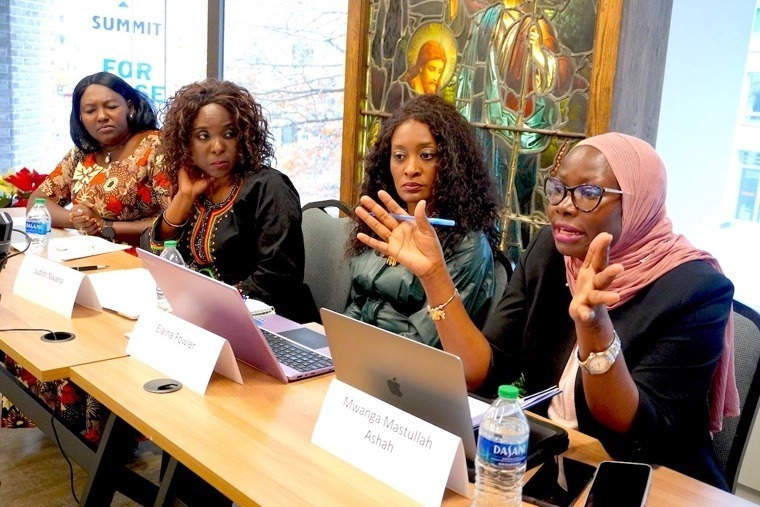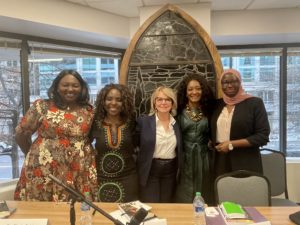On December 14, 2022, 21Wilberforce Director of Communications, Lou Sabatier, moderated a side event to the 2022 U.S. Africa Leaders’ Summit in Washington, DC. Titled “Women and IRF in Africa: Why Their Concerns are Overlooked”, the panel brought attention to women and international religious freedom in African countries. This event was a collaboration between the International Religious Freedom Roundtable Africa Working Group co-chaired by Scott Morgan and the International Religious Freedom Roundtable Women’s Working Group that is co-chaired by Lou Sabatier.
Four distinguished panelists (listed below) representing the countries of Nigeria, Cameroon, Uganda and the DRC shared about both visible and invisible concerns that women in their country, and all across Africa, experience. These include blasphemy, forced conversion, forced marriage, religious abductions, discrimination and lack of access to education and to justice among others.
Violations of religious freedom or belief (FoRB) impact all aspects of the lives of women (and girls) in Africa, including their human rights. Women and girls experience similar kinds of violations as do men, governments harass and imprison them, and state and non-state actors commit physical violence against them. But they also confront distinctive violations because of their gender and religion or belief identity, which often are intensified due to their social-economic status and cultural norms.
Because of these and other factors, women experience different kinds of violations than men. These violations include torture, rape, abduction, forced marriages, conversions, and renunciations of their faith. They can be difficult to detect because they frequently are committed by family and/or community members, sanctioned by cultural norms (often reinforced by religious law interpretations), and take place in the home and out of sight.
African women experience these violations in their important roles as mothers, wives, family members, workers, organizational leaders, civic leaders, advocates, and volunteers who serve and cultivate healthy communities. And when these women experience religious freedom violations their rights as women also are violated.
The right to freedom of religion or belief applies to men and women equally. But in practice, many women Africa face major difficulties in accessing this right.
In Africa, as with many other countries, the volume of incidents impacting women can be overwhelming. Laws do not protect them. Perpetrators are not often brought to justice. There are real systemic issues. We must continue to call out these offense while also building bridges with education for women to defend and advocate for themselves.
As human rights and religious freedom advocates, we often deploy grassroots campaigns to make their voices heard on issues, specific groups of people and individual cases. The goal is not to make a point but to make a difference—to get concrete results that have a tangible impact on people’s lives.
The International Religious Freedom Roundtable Women’s Working Group will launch an advocacy campaign early in 2023 in pursuit of specific goals to support women and IRF across four African countries: Cameroon, Democratic Republic of the Congo, Nigeria and Uganda. Learn more about the upcoming campaign here.
Watch the Dec. 14 Africa Summit Side Event video here
Women and IRF in Africa Panelists & Moderator
Mwanga Mastullah Ashah, PhD Human Rights Fellow, Makerere University; Executive Director, Islamic Women’s Initiative for Justice, Law and Peace, Global Director Family Law Reform, Alliance of Inclusive Muslims
Elaina Fowler, Founder/Principal, FWMgroup; Federal Affairs Associate, Secular Strategies; President, Former Chief of Staff to Texas House Representative who served as Honorary Consul to South Africa
Judith Nwana, Chair, Coalition for Dialogue and Negotiations; Steering Committee Member, Cameroon Humanitarian Relief Initiative
Dr. Gloria Puldu, President, LEAH Foundation; Global Director, Give Her Voice
Lou Ann Sabatier, Director of Communications, 21Wilberforce; Co-founder, FoRB Women’s Alliance; Co-Chair, IRF Roundtable Women’s Working Group
Read press coverage here.


